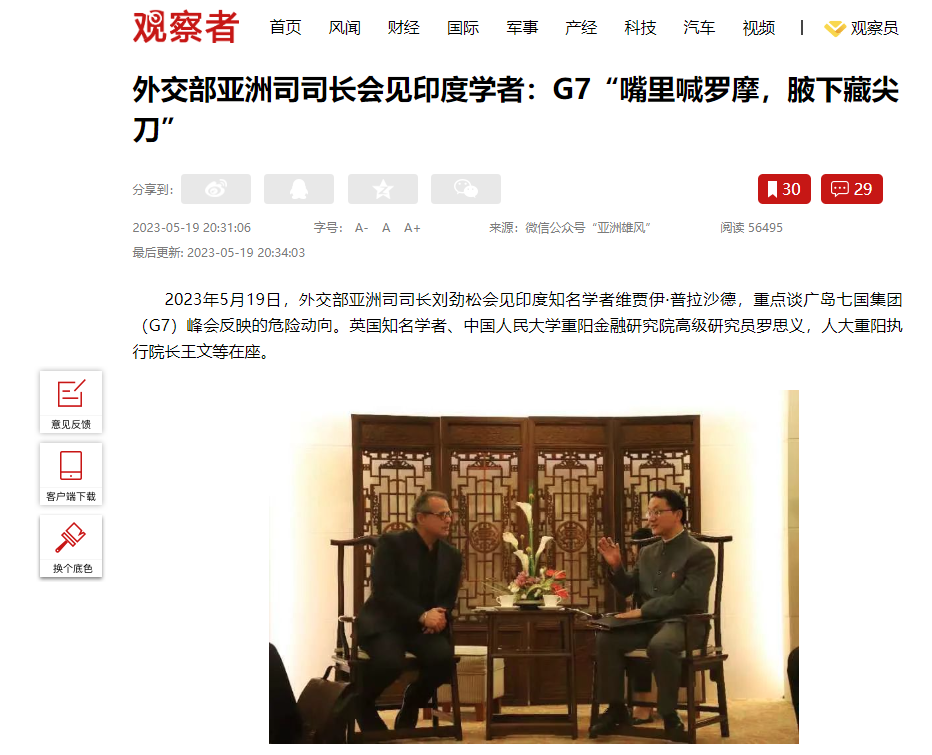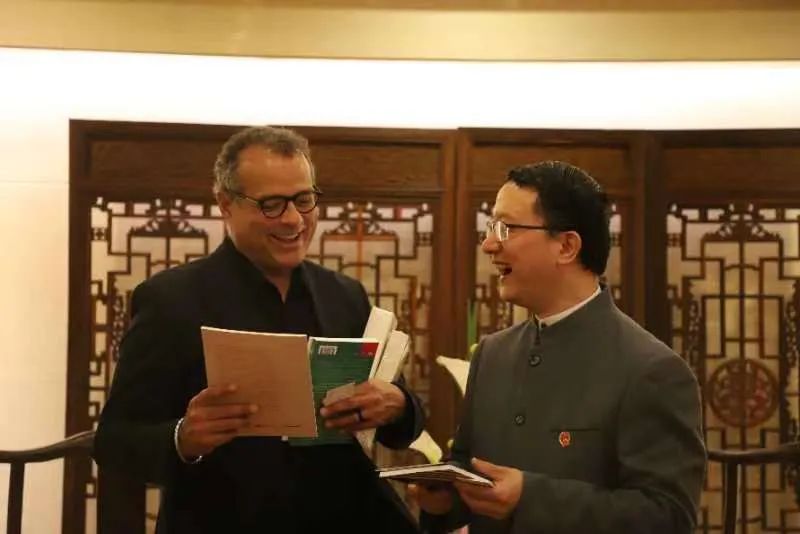LATEST INSIGHTS
Your Present Location: LATEST INSIGHTSThe Director-General of the Department of Asian Affairs of the Ministry of Foreign Affairs meets with Indian scholars
Source: Guancha Syndicate Published: 2023-05-19

On May 19, 2023, Director-General of the Department of Asian Affairs of the Ministry of Foreign Affairs Liu Jinsong met with well-known Indian scholar Vijay Prashad, focusing on the dangerous trends reflected in the Hiroshima Group of Seven (G7) summit. John Ross, a well-known British scholar and senior fellow of the Chongyang Institute for Financial Studies at Renmin University of China (RDCY), and Wang Wen, executive dean of RDCY, were present at this meeting.
Liu said that today the China-Central Asia Summit is being held in Xi'an, China, and there is also a G7 summit in Hiroshima, Japan. The China-Central Asia Summit is not aimed at any third party, and all participating countries are equal. They are committed to building a China-Central Asia community with a shared future featuring mutual assistance, common development, universal security, and friendship from generation to generation. On the contrary, the G7 summit divides the participating countries into various grades and ranks, keen to provoke geopolitical tensions and camp confrontations, and coerce other countries to choose sides. This contrast is stark, and people with a steelyard inside the heart can see it clearly.
Liu pointed out that when dealing with international and Asian affairs, there are two choices: going the right way or going the crooked way. The key points depend on whether to adhere to true multilateralism or seek unipolar or collective hegemony, whether to maintain the post-war international order or "use it if you agree, and abandon it when you disagree", whether you follow the trend of leading economic globalization or build "small courtyards and high walls", whether to encourage "decoupling and breaking chains", whether to insist on peaceful coexistence, win-win cooperation, openness and inclusiveness, or self-importance, the party unites against differences, "I win and you lose", whether to maintain international law and the basic norms of international relations, or to engage in small groups and small circles of "family law gangs"? "Standards", whether to insist on development as the center or superstitious force and military alliances.
Liu said the Indian proverb says,“Do not blame an uneven floor if you do not know how to dance.”The G7 itself has a lot of problems, and the countries concerned don't reflect on themselves, but point out the finger at other countries, deliberately diverting attention and transferring the crisis. This is absurd and ridiculous. Certain countries clings to hegemonic mentality and Cold War mentality, draw ideological lines, and gang up several allies via the G7, "Five Eyes Alliance", "QUAD" and“AUKUS”, which is essentially a resurgence of Cold War thinking and behavior. It poses a serious threat to the peace and stability of the world and Asia.
Liu said that Asian countries have similar cultural origins and close historical and practical ties. Most of them insist on independence, adhere to the path of peaceful development, and insist on focusing on economic construction. They do not support or participate in bloc politics, camp confrontation and arms races, which are the resources and bottom line for long-term peace, stability and economic development in Asia. Asian countries oppose to certain non-regional countries and the G7's "calling Rama in their mouths, hiding a sharp knife under their armpit" (Indian proverb), and opposing the comparison between East Asia and other regions, and the internal affairs of East Asian countries and the Ukrainian crisis with ulterior motives. Asian countries can think and create their own solutions to their own problems and those of their neighbors, blaze a new path of modernization and regional cooperation, and jointly build an Asian community with a shared future.
Liu also said that in an uncertain world, China's certainty is the mainstay for maintaining the peaceful development of the world and Asia. From 2013 to 2021, China's GDP grew at an average annual rate of 6.6%, higher than the world's average growth rate of 2.6% over the same period. From 2018 to 2022, China's GDP grew at an average annual rate of 5.2%, higher than the world's average growth rate of 2.3% over the same period. From 2013 to 2021, the total contribution rate of the G7 countries to world economic growth is not be as high as that of China alone. The International Monetary Fund predicts that China will continue to be the largest driver of global growth in the next five years, contributing about 22.6% to global economic growth, while the United States is only 11.3%. China's high-tech industry level and innovation capabilities are also growing rapidly. The 2023 edition of the global car company's future adaptability ranking released by the Swiss International Institute for Management Development shows that the ranking of Chinese car companies has risen rapidly, and BYD (比亚迪) has risen to the second place. Xiaopeng Motors (小鹏汽车), Li Auto (理想汽车) also performed well. China's long and promising economic development will provide a huge boost to the post-epidemic recovery of Asian countries.
Vijay Prashad said that the economic development of China is an astonishing miracle, which provides choices and hope for developing countries, and enhances confidence and courage. The majority of developing countries and Asian countries resent hegemony, imperialism and unilateralism, and increasingly dare to resist the US and Western countries to interfere in their internal affairs. We oppose the creation of divisions and confrontation in Asia, and "New Cold War" in all its forms and manifestatons.

The two sides also exchanged views on the issue of China-India relations.
Key Words: Asian, G7 Summit, GDP Development























































































 京公网安备 11010802037854号
京公网安备 11010802037854号





